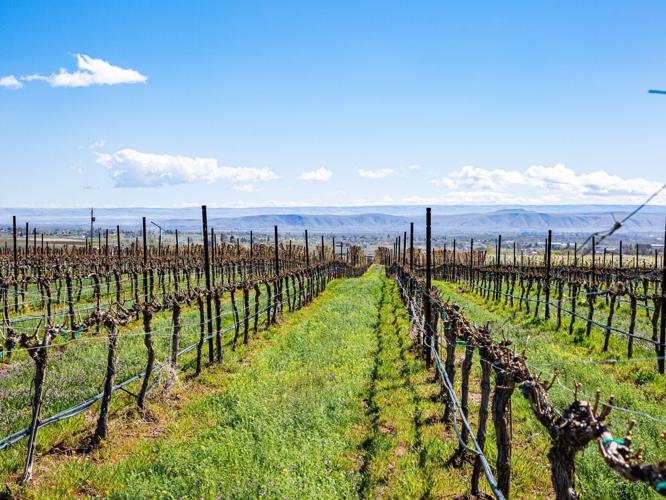
Photo by Barbara Glover
Sustainable winegrowing practices protect the soil, air and water — elements that breathe life into wine grapes and, ultimately, wine. Being good stewards of the land and good neighbors are principles that Yakima Valley wineries and vineyards live by every day.
Dineen and Two Mountain vineyards are among the first vineyards in Washington state to roll these practices into formal Lodi Rules for Sustainable Winegrowing. The “rules” are a set of over 120 farming standard practices that help farmers manage vineyards sustainably. They are divided into six categories: ecosystem management, water management, soil management, pest management, business management and human resources.
Adopting environmentally and socially responsible practices and making them an integral part of doing business is a way of ensuring the health of the land, the community, and the industry for generations to come. This is a philosophy Dineen and Two Mountain vineyards have always had; now they can identify that their grapes are sustainably grown directly on their wines.
“We believe all of this drives quality. We want to grow the very best wine grapes we can grow now and into the future,” says Marissa Dineen, co-owner of Dineen Vineyards. “We must look after the ecosystem, the sun, soil, wind, the biodiversity in our soils, beneficial insects, and less beneficial insects. We are very lucky to have a great group of people under Patrick’s leadership. His skill and knowledge are vital to farming to this level.”
Patrick Rawn, co-owner of Two Mountain Vineyards, farms his own vineyards as well as Dineen Vineyards. He believes it is important to start talking about the place the fruit comes from in an authentic way and be true to the way they are farming. “It gives validation to the values that we hold true to ourselves as well as how we farm.”
A self-proclaimed “technology geek,” Rawn studies and incorporates technology into his farming practices as much as possible. He reduced the amount of water he was putting on his vineyard by 25% when he began using moisture probes. Flow meters, another tool Rawn uses to conserve water and increase quality, measure the exact amount of water flowing through the watering system. He knows exactly how many gallons of water are being used per block.
“By automating irrigation cycles and knowing the amount of water flowing through the system, we can quickly recognize when something goes wrong,” said Rawn. “The system helps identify broken areas, allowing us to preserve water and optimize crop.”
High-resolution imagery is another piece of technology Rawn uses to identify problems early. Ceres Imaging uses fixed-wing aircraft to photograph the vineyards. These high-resolution photographs help identify potential issues, such as heat or water stress, from the air.
Rawn is also working on an experimental program with WSU. They are testing the use of drip irrigation by placing the end tube directly into the ground to reduce evaporation and increase accuracy of water placement.
Two Mountain and Dineen vineyards both use lace wing insects to help control the population of harmful bugs and insects in the vineyards. The newest technology for releasing insects is drones. The drones fly over the vineyard, slowly releasing beneficial insects. This is another advancement Rawn is looking forward to using this year.
Also, birdhouses and owl boxes are placed in the vineyards to encourage predatory birds to help control invertebrate pests.
Because of these and other sustainable practices, Two Mountain and Dineen Vineyard wines began labeling their wines as Certified Green under the Lodi Rules with the 2020 vintage. A wine must contain 85% Lodi Rules certified grapes to bear the prestigious seal.
• Barbara Glover is executive director of Wine Yakima Valley, an industry group representing member wineries. Her column runs every other week in Friday’s Explore section.